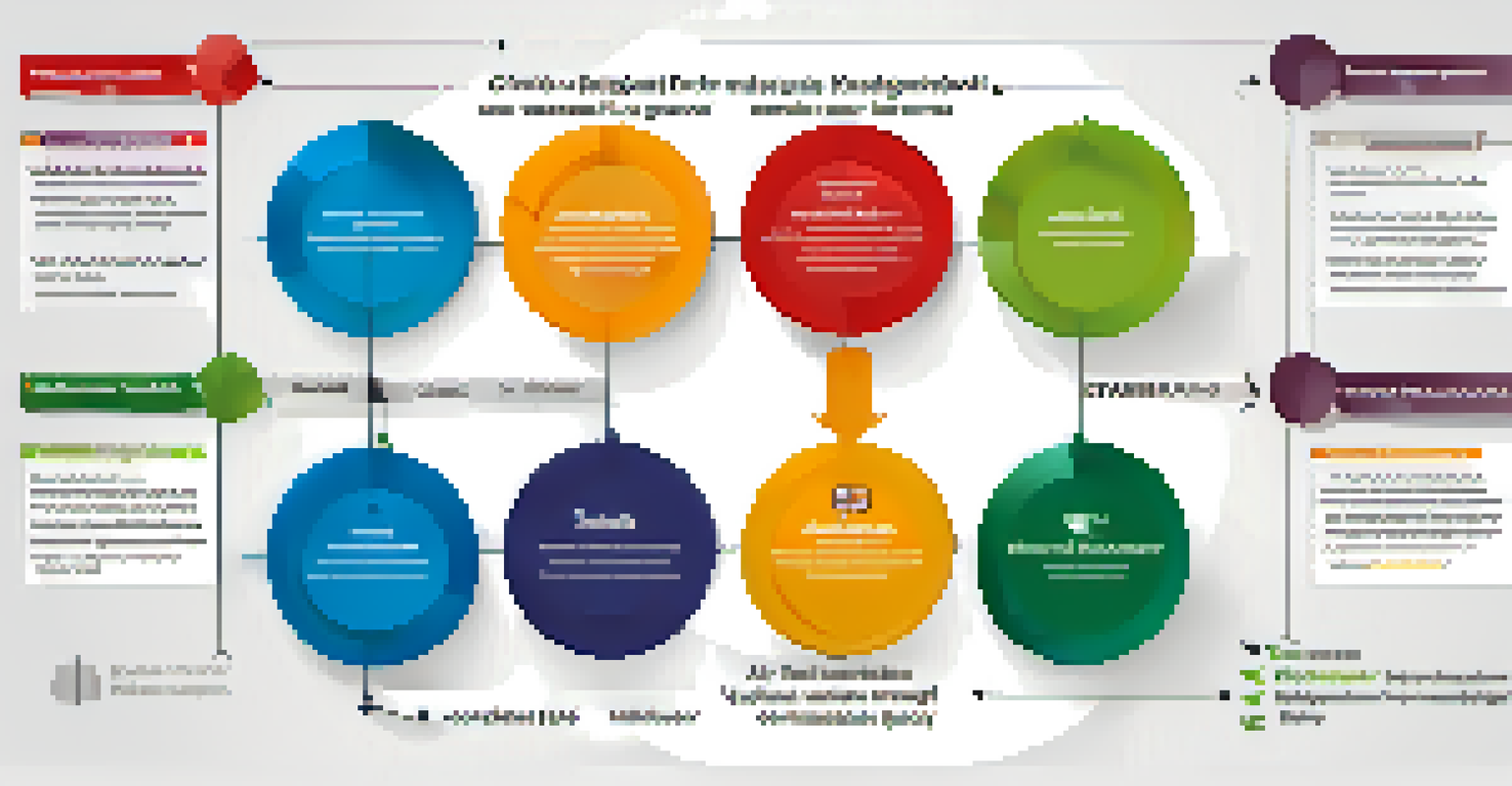Crisis Management Frameworks for Marijuana Policy Implementation

Understanding the Need for Crisis Management in Marijuana Policy
As marijuana policy continues to evolve, the need for an effective crisis management framework becomes more apparent. The legalization of marijuana presents unique challenges, including public health concerns and regulatory compliance. A well-structured crisis management strategy helps address these issues proactively, ensuring smoother implementation and public acceptance. By recognizing potential crises early on, stakeholders can better prepare to navigate the complexities of marijuana policy.
In the midst of chaos, there is also opportunity.
For example, jurisdictions that have legalized marijuana often face backlash from communities concerned about health and safety. Without a clear crisis management plan, misinformation can spread rapidly, leading to public distrust. Communication becomes key during these times, as officials must effectively convey the benefits and regulations surrounding marijuana use. By addressing concerns head-on, stakeholders can build a foundation of trust and transparency.
Ultimately, understanding the need for a crisis management framework is the first step toward successful marijuana policy implementation. It’s about anticipating challenges and having a plan ready to engage with the community. This proactive approach not only mitigates risks but also enhances the overall effectiveness of marijuana policies.
Key Components of a Successful Crisis Management Framework
A successful crisis management framework consists of several key components that work together to mitigate risks. These include risk assessment, communication strategies, and response plans. Each component plays a vital role in ensuring that stakeholders are prepared for potential crises that may arise during marijuana policy implementation. By clearly defining these elements, organizations can streamline their efforts.

For instance, conducting a thorough risk assessment allows policymakers to identify vulnerabilities within their marijuana policies. This could involve evaluating public perception, legal challenges, and potential health impacts. Once risks are identified, crafting effective communication strategies becomes essential. This might include social media campaigns or community forums to address concerns and provide accurate information.
Proactive Crisis Management is Essential
Anticipating potential crises in marijuana policy helps stakeholders prepare and fosters public trust.
Finally, having a robust response plan ensures that stakeholders can act quickly and decisively when a crisis occurs. This includes defining roles and responsibilities for team members and establishing clear protocols for communication. Together, these components create a comprehensive framework that enhances the resilience of marijuana policies.
Risk Assessment: Identifying Potential Crises Early
Risk assessment is a crucial first step in any crisis management framework, especially in the context of marijuana policy. By identifying potential crises early, stakeholders can formulate strategies to mitigate their impacts. This proactive approach not only safeguards public health but also fosters trust among community members. It’s about being prepared rather than reactive.
A crisis is a terrible thing to waste.
To conduct an effective risk assessment, policymakers should gather data on various factors, including public sentiment, legal challenges, and health statistics. For example, analyzing trends in marijuana-related incidents can provide insights into potential risks. This data-driven approach helps create a more accurate picture of the landscape surrounding marijuana policy, allowing for informed decision-making.
Moreover, engaging with the community during the risk assessment phase can uncover concerns that policymakers might not have considered. Open forums and surveys allow residents to voice their opinions and experiences, further enriching the assessment process. By actively listening to stakeholders, policymakers can ensure that their crisis management plans are both relevant and effective.
Effective Communication Strategies During a Crisis
Communication is paramount during a crisis, especially when implementing marijuana policies. Clear, transparent messaging can help alleviate fears and misinformation, paving the way for successful policy adoption. It’s essential to tailor communication strategies to fit the audience, ensuring that the information is accessible and relatable. This ensures that all stakeholders are on the same page.
For example, utilizing social media platforms allows for rapid dissemination of information and updates. Policymakers can use these channels to correct misinformation and provide factual data about marijuana use and regulation. Additionally, holding community meetings can create a space for dialogue, allowing residents to ask questions and express their concerns directly to decision-makers.
Engage Stakeholders for Success
Involving law enforcement, health officials, and community leaders creates a comprehensive crisis response.
Ultimately, effective communication during a crisis can strengthen community relationships and foster a sense of trust. By being open and honest, policymakers can demonstrate their commitment to public safety and wellbeing. This approach not only helps manage the current crisis but also lays the groundwork for future collaboration.
Engaging Stakeholders: Building a Collaborative Approach
Engaging stakeholders is vital for a successful crisis management framework in marijuana policy implementation. By involving various parties—such as law enforcement, health officials, and community leaders—policymakers can create a more comprehensive response to potential crises. This collaborative approach ensures that multiple perspectives are considered, leading to more effective solutions.
For instance, forming a coalition of stakeholders can facilitate regular communication and resource sharing. This could include joint training sessions or workshops on crisis management best practices. Such initiatives not only enhance preparedness but also foster relationships that can be invaluable during times of crisis.
Moreover, involving stakeholders in the decision-making process can lead to increased buy-in and support for marijuana policies. When individuals feel their voices are heard, they are more likely to embrace the policy and work collaboratively toward its success. This sense of ownership is essential for ensuring long-term stability and effectiveness.
Implementing Response Plans: Being Ready to Act
Having a response plan in place is crucial for addressing crises swiftly and effectively. A well-defined plan outlines the steps to be taken when a crisis occurs, ensuring that all team members know their roles and responsibilities. This level of preparedness can significantly reduce the impact of a crisis, allowing for a more controlled and effective response.
For example, response plans should include guidelines for communicating with the public and media during a crisis. This could involve designating a spokesperson to provide accurate information and updates. Additionally, the plan should outline protocols for addressing misinformation that may arise, ensuring that stakeholders are equipped to counter false narratives.
Continuous Learning Improves Strategies
Evaluating past crises enables policymakers to refine their approaches and enhance future crisis management.
Moreover, regular drills and simulations can help teams practice their response plans, making them more familiar with the procedures. This hands-on approach not only builds confidence but also uncovers potential weaknesses in the plan that can be addressed before a real crisis occurs. Being ready to act is key to minimizing the fallout from any challenges that may arise.
Evaluating and Learning from Crisis Management Experiences
Once a crisis has been managed, it’s essential to evaluate the response to identify successes and areas for improvement. This reflective practice not only enhances future crisis management efforts but also fosters a culture of continuous learning. By analyzing what worked and what didn’t, stakeholders can make informed adjustments to their frameworks.
For instance, conducting post-crisis evaluations can involve gathering feedback from team members and community stakeholders. These insights can highlight gaps in communication or areas where the response could have been more efficient. By taking the time to assess these elements, policymakers can refine their strategies for better outcomes in the future.

Additionally, sharing lessons learned with the broader community can promote transparency and trust. By openly discussing experiences, stakeholders can demonstrate their commitment to improvement and collaboration. This willingness to learn ultimately strengthens the foundation for future marijuana policy implementation.
The Future of Crisis Management in Marijuana Policy
As marijuana policy continues to evolve, the landscape of crisis management will also need to adapt. Emerging trends, such as shifts in public perception and changes in legislation, will shape the way stakeholders approach crisis management. Staying informed and flexible will be key to navigating these changes effectively.
For example, as new research emerges about the health impacts of marijuana, policymakers may need to adjust their crisis management strategies accordingly. This could involve updating communication plans or re-evaluating risk assessments based on the latest findings. Being proactive in this way ensures that stakeholders remain prepared for any challenges that may arise.
Ultimately, the future of crisis management in marijuana policy lies in collaboration, transparency, and adaptability. By fostering strong relationships with stakeholders and remaining open to change, policymakers can navigate the complexities of marijuana implementation with confidence. A resilient crisis management framework will be essential for ensuring the long-term success of marijuana policies.